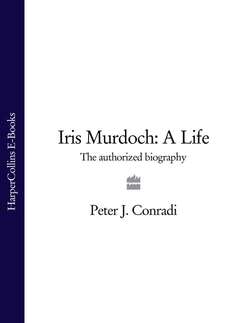Читать книгу Iris Murdoch: A Life: The Authorized Biography - Peter Conradi J. - Страница 26
8
ОглавлениеThe bond between Iris and Hughes was very great. He played both father and, to some degree, mother. It was said to be Hughes who bought her elaborate school outfits at Bourne & Hollingsworth on Oxford Street, when she went away to Badminton in 1932, and he shared the task of taking her to Froebel in the mornings. Redeeming himself after his schooldays, it was he who often did the laundry. Rene was no more a housekeeper than Iris turned out to be. She was ‘not a housekeeper at all’, much to grandmother Louisa’s distress. Louisa was certainly, says Sybil, horrified that her son should have to do so many of the things women were then expected to do. Cleaver, more directly, says that Aunt Ella thought of Rene as having ‘sluttish ways’, a wife who could not even cook for her husband or keep a tidy house. Sybil also remembers Hughes doing the gardening, housekeeping, laundry, much of the shopping and organising, for example, the travel arrangements for the annual Irish trip. He cooked and washed up while Rene sat back and looked pretty. No one did much cleaning. Once Cleaver was staying in Chiswick and he and Hughes came in late. ‘Have you had anything to eat?’ asked Rene, and on learning that they had not, went off to the kitchen to cook, ‘with an expression on her face’ at having to do so. Bayley takes another view. The Belfast ethos, from which Hughes was in lifelong flight, militated against Rene’s domestic virtues being fairly appraised.43 He remembers Irene cooking and washing up, smoking a cigarette, and believes she was competent without being house-proud, taking her housekeeping duties lightly. Cleaver does not recall Chiswick being very untidy. There was no home-help, no car, and no wine at home: the family could not afford it.
Hughes is remembered by John Bayley as asking either Rene or Iris or both, in his mild Ulster brogue, ‘Have you no sense at all, woman?’ The question was good-humoured and rhetorical, and there is a danger of making Hughes sound like Nora’s husband Torvald in Ibsen’s A Doll’s House. A biographer wishing to fuel such a comparison would make much of the only facial expression of her father’s Iris recorded, a look of ‘impatient nervous irritation’ which she feared she inherited;44 and of Rene’s lost singing career, a loss that probably caused Iris more grief than it did easy-going Irene. Hughes did ‘baby’ Rene, who would simply say sweetly in her Dublin brogue, ‘If that makes him happy … There’s no point in fighting over a thing like that'; ‘Well, if he wants to do that, let him get on with it.’ Rene got her hair seen to, sang in a choir, joined a swimming club (a photo of young Iris and Irene there survives), played bridge.45 There was a piano at Eastbourne Road. When Hughes died in 1958 the family were very concerned about how Rene would cope. But, as the Belfast cousins wryly put it, ‘it’s wonderful what you can do when you’ve got to’.46 She turned out to be perfectly well able to look after herself, until old age and illness supervened.
Unlike Nora and Torvald, Rene and Hughes were clearly extremely happy together. Rene increasingly saw herself as a ‘duckling that had hatched a swan’ – she didn’t know what Iris was doing, quite, but was all in favour of it anyway.47 Cleaver remembers Rene’s physical and inner beauty alike: ‘welcoming, cheerful, charming … lovely’. She was very pretty and good fun, with a happy temperament, vivacious, often laughing or smiling, a jolly and welcoming and open-hearted person. In early photographs Irene is dark-haired. Later on she dyed it blonde. Once, when Louisa, Irene and Sybil were waiting for a bus, coming home from shopping, both Louisa and Irene burdened with parcels, a gallant young man sprang to Irene’s rescue, taking her parcels for her. Poor elderly Louisa had to fend for herself. ‘Now you see what blonde hair can do for you,’ Irene quipped: if capable of being a vamp, she could also be witty.
Hughes, formal, dignified, interested in everything that was going on in the world, was more serious than Irene but seemed contented, at peace with himself. Elias Canetti would later recall him as ‘thoughtful, tremendously engaging’.48 One of his fingernails was broken and grew in a horny, claw-like shape, in evidence when he counted his cigarettes. Probably he had injured it during the war. He would speak of the long Tube journey into work, where, at a later period, he was known as ‘Old Murdoch’,49 seeming self-contained to the point of isolation, an ‘odd bird’ working on the census with a personal grade of Assistant Registrar General at Somerset House in 1950 when he retired. He did not light any fires, but worked quietly, unassumingly, ably, treating everyone with great courtesy.50 He had a sense of humour, told jokes against himself.51
